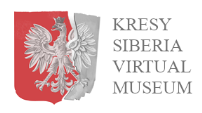Hall of Images
Pacewicz Family
| File Upload | Title | Description | Related military service | Related Museum Gallery | Related Wall of Tribute Links | ||||||
|---|---|---|---|---|---|---|---|---|---|---|---|
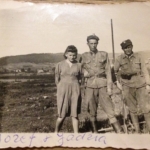 |
Jozef Pacewicz circa 1945 Polish Army |
Left to right, Jadzia Pacewicz, Jozef Pacewicz, unknown: Most likely in the 8th Dresden Infantry Division, Polish Army (under Soviet command) possibly 1945 or just after between Jasło and Rzeszów in a German field camp for Soviet prisoners (the large fences are visible behind). |
Conscripted into the Red Army |
||||||||
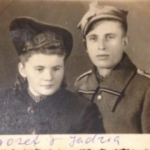 |
Jadzia and Jozef Pacewicz 1946 |
Jadzia and Jozef Pacewicz - Krosno 12.11.1946. Jozef was in the 8th Dresden Infantry Division. Seen on his lapels Dark blue-white stripe-dark blue is "Wojska samochodowe" - motorized division. |
Conscripted into the Red Army |
||||||||
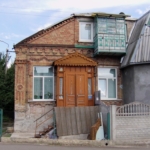 |
Home of Pacewicz family, Równe |
Home of PP Jan Pacewicz, wife Julia Pacewicz and children Józef, Jadwiga and Władysław Rowne, Ul Dworecka 29/1, from where Julia, Jadwiga and Władysław were deported from on the 13th April 1940 to Kazkahstan. |
|||||||||
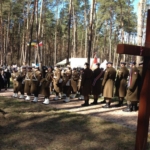 |
75th anniversary of Katyn Massacres – Bykownia |
75th Anniversary memorial of the Katyń Massacres for the victims of the Ukraine List at Bykownia, just outside Kiev in Ukraine on 9th April 2015 with the Polish Honour Guard. This is the final resting place of Jan Pacewicz, PP, Równe. |
September 1939 Campaign |
||||||||
 |
Paradowski’s after the war |
The family of my Babcia Julia Pacewicz's (nee Paradowska) brother Stanisław: From left to right: Stanisław Paradowski, wife Tekla (nee Dobrowolska), youngest daughter Marysia born 1946, Babcia?, Zosia (blonde girl at back - a cousin), baby?, eldest daughter Helena Nawicki and husband - Western Poland having been forcibly repatriated from Krzemieniec, Wołyn. Tekla and Helena survived an attack by UPA in 1943. |
|||||||||
 |
Paradowski’s after the war |
Julia Pacewicz (nee Paradowska) reunited in Poland in 1961 with her sister-in-law Tekla Paradowska (nee Dobrowolska). They were from Krzemieniec in Wołyn and were separated in 1940 when Julia and two of her children were deported to Kazakhstan. Julia remained exiled in the West. Tekla and her daughter Helena narrowly escaped with their lives from UPA bandits in 1943 who tried to break into their home and murder them. In 1946 they were repatriated, with Tekla's husband Stanisław Paradowski (Berling's Army) to Legnića in Western Poland. |
|||||||||
 |
Paradowski’s after the war |
Paradowski siblings reunited in Poland approx 1961. Seated in the middle from left to right: Manya Paradowska, sister Julia Pacewicz (nee Paradowska), Tekla Paradowska (nee Dobrowolska). Standing behind from left to right: Helena Nawicki and husband (daughter of Stanisław and Tekla Paradowski), Stanisław Paradowski (with moustache), Jozef Pacewicz (Julia's son), Marysia and husband (Helena's sister). Children at the bottom are Staszek and Tekla's grandchildren. They were separated when Julia was deported to Kazakhstan with two of her children in 1940. She remained exiled in the UK and this was the first time she was reunited with her family, including her son Jozef who remained in Poland. |
|||||||||
 |
Paradowski’s after the war |
Paradowski siblings reunited in Poland approx 1961. From left to right: Stanisław Paradowski, sister Manya Paradowska, sister Julia Pacewicz (nee Paradowska), Tekla Paradowska (Stanisław's wife, nee Dobrowolska) and Jozef Pacewicz (Julia's son). The Paradowski's were from Krzemieniec. They were separated when Julia was deported to Kazakhstan with two of her children in 1940. She remained exiled in the UK and this was the first time she was reunited with her family, including her son Jozef who remained in Poland. |
|||||||||
 |
Paradowska sisters after the war |
My babcia Julia Pacewicz (nee Paradowska) far right reunited with her sister Manya on the left after the war in Poland. They were from Krzemieniec, Wołyn. Julia was deported to Kazakhstan was exiled in the West. Manya was forcibly repatriated from Krzemieniec to Western Poland in 1946. |
|||||||||
 |
Kedzierski family |
Jadwiga Kedzierska (nee Pacewicz), husband Janek Kedzierski with son Witold 1948. Jadzia married Jan Kedzierski on 08.09.1945 at St John’s Roman Catholic Church, Perth. They were both stationed at Dupplin Castle, Perth. Jan Kedzierski was a Second Lieutenant, 1st Polish Corps in Scotland. He was born in Kuty, Poland, 7 Feb 1920. In the early part of the war in Scotland he served in an Officer’s Cadre Rifle Brigade. My aunt Jadwiga Pacewicz (sister to Wladyslaw) was a Sister with the Polish Red Cross and PWSK after her evacuation from exile in the USSR (deported 13th April 1940 from Rowne to Kazakhstan). She served in Teheran, Iraq, Egypt, Palestine and in 1944 was transferred to the UK where she was posted to 1 PWAS Battalion, 1 Polish Corps – to Polish General Hospital No 4 and then transferred to Polish General Hospital No 2 “SEFA” in Perth. Jadwiga and Janek Kedzierski settled in Luton, UK after the war. |
Polish 1st Corps in Europe (Gen. Maczek) |
||||||||
 |
Julia and Jozef Pacewicz reunited |
On a visit to Poland after the war Julia Pacewicz (middle) is reunited with her son Jozef Pacewicz. On the far left is Jozef's wife, Jadwiga. Julia and Jozef were separated in April 1940 when Julia and her other two children Wladyslaw and Jadzia were deported to Kazakhstan. They eventually settled in the UK after the war. Jozef missed the arrests in Rowne on 13th April 1940. He was 17 years old. He made his way to the station and found his family waiting to be deported in the cattle wagons. The Red Soldier guards would not let him join his family. He fled to family in Krzemieniec and in 1944 joined the Polish People's Army, settling with wife Jadwiga in Krosno after the war. |
Polish Kosciuszko Division (Gen. Berling) |
||||||||
 |
Jozef Pacewicz grave in Krosno |
Burial place and headstone of my uncle Jozef "Jozio" in Krosno, Poland 7/7/1922 - 4/7/1986. His wife Jadwiga Pacewicz is buried next to him. Jozef missed the deportation of his family to Kazakhstan on 13th April 1940. He tried to join them on the wagons at Rowne station but was held back by Red Army soldiers. He fled to family in Krzemieniec and in early 1945 was drafted into the 8th Dresden Infantry Division of the Polish People's Army. He remained in Poland after the war, settling in Krosno. His mother and two siblings remained exiled in the west. With thanks to Jacek for visiting his grave and placing flowers. |
Conscripted into the Red Army |
|
|||||||
 |
Jozef Pacewicz grave in Krosno |
Burial place and headstone of my uncle Jozef "Jozio" in Krosno, Poland 7/7/1922 - 4/7/1986. His wife Jadwiga Pacewicz is buried next to him. Jozef missed the deportation of his family to Kazakhstan on 13th April 1940. He tried to join them on the wagons at Rowne station but was held back by Red Army soldiers. He fled to family in Krzemieniec and in early 1945 was drafted into the 8th Dresden Infantry Division of the Polish People's Army. He remained in Poland after the war, settling in Krosno. His mother and two siblings remained exiled in the west. With thanks to Jacek for visiting his grave and placing flowers. |
Conscripted into the Red Army |
|
|||||||
 |
Jadzia Kedzierska and son |
Jadwiga Kedzierska (nee Pacewicz) with son - Witold or Wojtek? Jadzia married Jan Kedzierski on 08.09.1945 at St John’s Roman Catholic Church, Perth. They were both stationed at Dupplin Castle, Perth. Jan Kedzierski was a Second Lieutenant, 1st Polish Corps in Scotland. He was born in Kuty, Poland, 7 Feb 1920. In the early part of the war in Scotland he served in an Officer’s Cadre Rifle Brigade. My aunt Jadwiga Pacewicz (sister to Wladyslaw) was a Sister with the Polish Red Cross and PWSK after her evacuation from exile in the USSR (deported 13th April 1940 from Rowne to Kazakhstan). She served in Teheran, Iraq, Egypt, Palestine and in 1944 was transferred to the UK where she was posted to 1 PWAS Battalion, 1 Polish Corps – to Polish General Hospital No 4 and then transferred to Polish General Hospital No 2 “SEFA” in Perth. Jadwiga and Janek Kedzierski settled in Luton, UK after the war. |
Polish 1st Corps in Europe (Gen. Maczek) |
||||||||
 |
Deportation map for Pacewicz |
This map of Northern Kazakhstan shows where Julia, Jadwiga and Wladyslaw Pacewicz were deported to - Kazakhstan, Kiellrowski region, village Krasnodolsk. On the map there is a railway line going south from Petropavlovsk "Kiellrowska". In this region there is still a Polish Catholic Parish and many Polish descendants still living there. Map in the Sybirak Museum, Białystok |
|||||||||
 |
WW2 Medals of Stanislaw Paradowski |
Staszek, from Krzemieniec (my father's uncle) fought in the September 1939 campaign in the 43 Pułk Piechoty in Dubno. In 1944 he was enlisted in the 1st Polish Army (Berling's Army under Soviet command). He fought from Praga through to the Battle of Berlin and was highly decorated for bravery. These medals are Soviet Medals: Za wyzwolenie Warszawy Za Pobiedu Za zdobycie Berlina Polish Medals: Za udział w walkach o Berlin Odra, Nysa i Bałtyk Za Warszawę 1939-45 Zwycięstwa i Wolności 1945 Krzyż Kawalerski Orderu Odrodzenia Polski Brązowy Medal Zasłużonym na Polu Chwały Odznaka Grunwaldzka Krzyż Walecznych Za udział w wojnie obronnej 1939 r. Medal bottom middle is my father's 1920 Cross of Valour |
Polish Kosciuszko Division (Gen. Berling) |
|
|||||||
 |
Medal certificate of Stanislaw Paradowski |
Staszek, from Krzemieniec (my father's uncle) fought in the September 1939 campaign in the 43 Pułk Piechoty in Dubno. In 1944 he was enlisted in the 1st Polish Army (Berling's Army under Soviet command). He fought from Praga through to the Battle of Berlin and was highly decorated for bravery. This medal certificate translates as "To a Soldier of democracy for the fight aginst the German invader for Poland, Freedom and the people". |
Polish Kosciuszko Division (Gen. Berling) |
|
|||||||
 |
Tekla Paradowska (nee Dobrowsolska) |
Tekla Paradowska in her 90's (in the 1990s) in Ruja, Silesia. Tekla was married to my father's uncle - Stanisław Paradowski and they lived in Bonówka, gmina Uhorsk, powiat Krzemieniec, Wołyn with daughter Helena born in 1934. Staszek fought in the Sept 1939 campaign and then enlisted in "Berling's Army". In 1943 Tekla and her daughter Helena fled their home in the middle of the night from maurading UPA bandits trying to murder them. They were saved by a Ukrainian neighbour, who was a friend of Tekla's. In 1946 the family were "repatriated" from Krzemieniec to Legnića in Western Poland. They both lived into their 90's. My father visited them in Poland in the 1990's, having not seen them since before the war. |
Conscripted into the Red Army |
|
|||||||
 |
In memory of Wladyslaw and Julia Pacewicz |
Gravestones side-by-side of my Babcia Julia Pacewicz (nee Paradowska) and my father Wladyslaw Pacewicz in Luton, United Kingdom. They were deported from Rowne to Kazakhstan on 13th April 1940 and after the war settled in the UK. My aunt Jadwiga Kedzierska (nee Pacewicz) is also buried there. The eldest Jozef Pacewicz is buried in Krosno, Poland. |
Polish navy |
|
|||||||
 |
Crossing the Equator document |
My father Wladyslaw Pacewicz in the Polish Navy. He volunteered as a 13 year old in USSR and served from 1942 - 1945 on ORP Piorun and ORP Garland. This document was presented to him when he crossed the equator on board the destroyer ORP Garland. It is dated 11th Feb 1944 and it is signed by the ship's commander Biskupski. According to the ship's service records from Jan-March 1944 ORP Garland was deployed at Freetown for service in Eastern Mediterranean. |
Polish navy |
|
|
||||||
 |
Jozef and Jadwiga Pacewicz 1955 |
My uncle Jozef "Jozio" and his wife Jadzia in Poland 1955. The photograph is signed on the back to his dear brother (my father Wladek) in Great Britain. Jozef missed the deportation of his family to Kazakhstan on 13th April 1940. He tried to join them on the wagons at Rowne station but was held back by Red Army soldiers. He fled to family in Krzemieniec and in early 1945 was drafted into the 8th Dresden Infantry Division of the Polish People's Army. He remained in Poland after the war, settling in Krosno whilst the rest of his family were exiled in the west. |
Conscripted into the Red Army |
|
|||||||
 |
Jozef and mother Julia Pacewicz 1963 |
My uncle Jozef "Jozio" and his mother Julia Pacewicz in Poland 10th July 1963. Jozef missed the deportation of his family to Kazakhstan on 13th April 1940. He tried to join them on the wagons at Rowne station but was held back by Red Army soldiers. He fled to family in Krzemieniec and in early 1945 was drafted into the 8th Dresden Infantry Division of the Polish People's Army. He remained in Poland after the war, settling in Krosno. His mother Julia Pacewicz (nee Paradowska - my grandmother) was deported to USSR with her two remaining children. After release she was a refugee in Koja until 1949. She settled in Great Britain. This photograph was taken on a visit to her son in Poland in 1963. |
|
||||||||
 |
Jozef Pacewicz in Poland 1949 |
My uncle Jozef "Jozio" in Poland in 1949. Jozef missed the deportation of his family to Kazakhstan on 13th April 1940. He tried to join them on the wagons at Rowne station but was held back by Red Army soldiers. He fled to family in Krzemieniec and in early 1945 was drafted into the 8th Dresden Infantry Division of the Polish People's Army. He remained in Poland after the war, settling in Krosno. His mother and two siblings remained exiled in the west. This photograph is signed to his dear brother (my father Wladyslaw). |
Conscripted into the Red Army |
|
|||||||
 |
Katyn Ukraine List Memo 2 |
First page of the file of the 3,435 prisoners from the Katyn Ukraine List. The files were in 5 bags and were accompanied with a letter from Tsvetukhin, Head of Special Section No 1 of the NKVD of the Ukrainian Soviet Socialist Republic, Senior State Security Lieutenant to Bashtakov, NKVD, Major of State Security, Moscow. File of my grandfather Jan Pacewicz murdered in Katyn Kiev-Bykownia included in this. |
|
||||||||
 |
Katyn Ukraine List Memo 3 |
Page of the file of the 3,435 prisoners from the Katyn Ukraine List detailing my grandfather Jan Pacewicz (no 2238 born in 1895). The files were in 5 bags and were accompanied with a letter from Tsvetukhin, Head of Special Section No 1 of the NKVD of the Ukrainian Soviet Socialist Republic, Senior State Security Lieutenant to Bashtakov, NKVD, Major of State Security, Moscow. File of my grandfather Jan Pacewicz murdered in Katyn Kiev-Bykownia. |
|
||||||||
 |
Katyn Ukraine List Memo 4 |
Last page of the file of the 3,435 prisoners from the Katyn Ukraine List. The files were in 5 bags and were accompanied with a letter from Tsvetukhin, Head of Special Section No 1 of the NKVD of the Ukrainian Soviet Socialist Republic, Senior State Security Lieutenant to Bashtakov, NKVD, Major of State Security, Moscow. File of my grandfather Jan Pacewicz murdered in Katyn Kiev-Bykownia and is detailed in this list. |
|
||||||||
 |
Medals Entitlement Document |
On the 1st September 1994 the President of the Republic of Poland, Lech Wałęsa, honoured Wladyslaw Pacewicz with the Polish Cross of the act of combat with forces in the West. This was presented at the Polish Consulate in Edinburgh. |
Polish navy |
|
|||||||
 |
Wedding Janek & Jadwiga Kedzierski |
Wedding of my aunt Jadwiga nee Pacewicz to Jan Kedzierski on 08.09.1945 at St John’s Roman Catholic Church, Perth. They were both stationed at Dupplin Castle, Perth. Jan Kedzierski was a Second Lieutenant, 1st Polish Corps in Scotland. He was born in Kuty, Poland, 7 Feb 1920. In the early part of the war in Scotland he served in an Officer’s Cadre Rifle Brigade. My aunt Jadwiga Pacewicz (sister to Wladyslaw) was a Sister with the Polish Red Cross and PWSK after her evacuation from exile in the USSR (deported 13th April 1940 from Rowne to Kazakhstan). She served in Teheran, Iraq, Egypt, Palestine and in 1944 was transferred to the UK where she was posted to 1 PWAS Battalion, 1 Polish Corps – to Polish General Hospital No 4 and then transferred to Polish General Hospital No 2 “SEFA” in Perth. Jadwiga and Janek Kedzierski settled in Luton, UK after the war. |
Polish 1st Corps in Europe (Gen. Maczek) |
|
|||||||
 |
Wladyslaw Pacewicz |
My father Wladyslaw Pacewicz in the Polish Navy. He volunteered as a 13 year old in USSR and served from 1942 - 1945 on ORP Piorun and ORP Garland. This photograph was taken sometime after the war. Wladyslaw was demobbed from the Navy in 1947 and settled in Scotland. |
Polish navy |
|
|||||||
 |
Wladyslaw Pacewicz after WW2 |
My father Wladyslaw Pacewicz in Scotland. He was deported to Kazakhstan on 13th April 1940 as an 11 year old. After release with Anders Army he served in the Polish Navy, settling in Scotland after the war. |
Polish navy |
|
|||||||
 |
Wladyslaw Pacewicz after WW2 |
My father Wladyslaw Pacewicz in Scotland. He was deported to Kazakhstan on 13th April 1940 as an 11 year old. After release with Anders Army he served in the Polish Navy as a cook, settling in Scotland after the war. |
Polish navy |
|
|||||||
 |
Wladyslaw Pacewicz reunited with Stanislaw Paradowski |
This photograph was taken in the early 1990s when my father Wladek was reunited with his uncle Staszek. They had not seen each other since my father was a child in Wołyn. Wladek was deported from Rowne to Siberia in April 1940 and after release with Anders Army joined the Polish Navy, settling in Scotland after the War. Staszek, from Krzemieniec (my father's mother's brother) fought in the September 1939 campaign in the 43 Pułk Piechoty in Dubno. In 1944 he was enlisted in the 1st Polish Army (Berling's Army under Soviet command). He fought right through the campaign and the Battle of Berlin and was highly decorated for bravery. In 1946 he was "repatriated" with his family (his wife and children chased from their home by UPA) to Legnića in Silesia. |
Polish navy |
|
|||||||
 |
Wladyslaw Pacewicz receiving medal 1994 |
Wladyslaw Pacewicz receiving "Battle of Marine Convoys, Polish Armed Forces in the West 1939-45" medal from the Republic of Poland 1994 (President, Lech Walesa) at the Polish Consulate in Edinburgh in 1994. Wladek served in the Polish Navy from 1942-45, after escaping exile in the USSR with Anders Army. |
Polish navy |
|
|||||||
 |
Wladyslaw Pacewicz receiving medal 1994 (2) |
Wladyslaw Pacewicz receiving "Battle of Marine Convoys, Polish Armed Forces in the West 1939-45" medal from the Republic of Poland 1994 (Lech Walesa) - at the Polish Consulate in Edinburgh. Wladek served in the Polish Navy from 1942-45, after escaping USSR with Anders Army. He is standing on the right in the picture. |
Polish navy |
|
|||||||
 |
Wladyslaw Pacewicz in Gdansk |
Wladek Pacewicz in the 1990s at the Polish Navy museum in Gdansk. Wladek served in the Polish Navy from 1942 after escaping the USSR with Anders Army. He had always wanted to visit Westerplatte, where the first shots of WW2 were fired. |
Polish navy |
|
|||||||
 |
Polish Honour Guard ceremony |
The opening ceremony of the Katyn memorial & cemetery in Bykownia-Kiev, Ukraine was given a full military state funeral. Here is the Polish Honour Guard who fired three volleys into the air in honour of the victims - the 3,435 victims of the Katyn Ukraine List. This included Jan Pacewicz, PP Rowne. |
|||||||||
 |
Plaque for Katyn victim Jan Pacewicz |
Plaque for Jan Pacewicz, PP Rowne, at the Polish cemetery in Bykownia-Kiev, Ukraine for the Katyn Ukraine List vicitms. |
|
||||||||
 |
Katyn poster in Warsaw |
This poster in Warsaw commemorates the Ukraine List of Katyn victims in Bykownia-Kiev, where Jan Pacewicz was executed. |
|||||||||
 |
USSR Railway Map – Kazakhstan – 1941 |
Shows the railway network across Kazakhstan in 1941. Along the top is Petropavlovsk on the Omsk line. This would most likely have been the route my family would have taken. The nearest big city to their place of forced labour was Petropavlovsk. |
|||||||||
 |
USSR Railway Map – Kazakhstan – 1941 |
Shows the railway network across the Kazakhstan in 1941. Akmolinsk is the central junction. Petropavlovsk, at the very top, would have been the nearest main station to the place of my family's deportation and forced labour. |
|||||||||
 |
USSR Railway Map 1941 |
Shows the railway network across the whole of the USSR in 1941 |
|||||||||
 |
Wladyslaw Pacewicz Back of Polish Navy card |
Identification card for Polish Navy |
Polish navy |
|
|
||||||
 |
Wladyslaw Pacewicz Navy |
My father Wladyslaw Pacewicz in the Polish Navy. He volunteered as a 13 year old in USSR and served from 1942 - 1945 on ORP Piorun and ORP Garland. |
Polish navy |
|
|
||||||
 |
Wladyslaw Pacewicz communion |
My father, Wladyslaw Pacewicz. Communion in Rowne, Wolyn before WW2 - probably around 1935. He was deported to Kazakhstan on 13th April 1940 with his mother and sister. His father Jan Pacewicz was murdered in the Katyn Massacres. After release from USSR Wladyslaw served in the Polish Navy. |
Polish navy |
|
|||||||
 |
Wladyslaw Pacewicz at the grave of his brother, Jozef |
My father Wladyslaw Pacewicz in the 1990s at the grave of his brother Jozef in Krosno Poland. They were separated in April 1940 when Wladek was deported to Kazahstan with his mother and sister. Their father was killed in Katyn. Jozef escaped deportation, later to be conscripted into the Red Army. He remained in Poland after the War. |
|
||||||||
 |
Wladyslaw Pacewicz after WW2 |
My father Wladyslaw Pacewicz. He was deported to USSR and served in the Polish Navy. He settled in Scotland after the War. |
Polish navy |
|
|||||||
 |
Polish Navy document for Wladyslaw Pacewicz |
Front of Polish Navy identification / document for my father Wladysalw Pacewicz |
Polish navy |
|
|||||||
 |
Polish Navy crew |
My father, Wladyslaw Pacewicz, is kneeling centre, front. He served in the Polish Navy from 1942 - 1945, joining as a 14 year old recruit from the USSR on ORP Piorun and ORP Garland. |
Polish navy |
|
|
||||||
 |
Julia Pacewicz before WW2 |
My babcia Julia Pacewicz nee Paradowska born Krzemieniec 1900. She was deported to Kazakhstan on 13th April 1940 from Rowne with two of her children Wladyslaw (my father) and Jadwiga. Her eldest son Jozef missed the arrest and was not allowed on the cattle wagon with them. Julia's husband (my grandfather) Jan Pacewicz, PP, was murdered in the Katyn massacre. After release from the USSR with Anders Army, Julia was a refugee in Koja, East Africa and settled in the UK in 1948. |
|
||||||||
 |
Jozef Pacewicz 1956 |
My uncle Jozef "Jozio" in Poland at Wawel Castle in Krakow 7th February 1956. Jozef missed the deportation of his family to Kazakhstan on 13th April 1940. He tried to join them on the wagons at Rowne station but was held back by Red Army soldiers. He fled to family in Krzemieniec and in early 1945 was drafted into the 8th Dresden Infantry Division of the Polish People's Army. He remained in Poland after the war, settling in Krosno whilst the rest of his family were exiled in the west. |
Conscripted into the Red Army |
|
|||||||
 |
Jadwiga Kedzierska (nee Pacewicz) PWSK |
My aunt Jadwiga Pacewicz (sister to Wladyslaw) as a Sister with the Polish Red Cross and PWSK after her evacuation from exile in the USSR (deported 13th April 1940 from Rowne to Kazakhstan). She served in Teheran, Iraq, Egypt, Palestine and in 1944 was transferred to the UK where she was posted to 1 PWAS Battalion, 1 Polish Corps – to Polish General Hospital No 4 and then transferred to Polish General Hospital No 2 “SEFA” in Perth. She remained in the UK after the war. |
Women's Army Auxiliary Service |
|
|
||||||
 |
Jadwiga Kedzierska (nee Pacewicz) pre WW2 |
Jadwiga Kedzierska (nee Pacewicz) - sister to my father Wladyslaw Pacewicz. She was born in 1924 and brought up in Rowne, Wołyn. This photograph is pre WW2 and her deportation to Siberia. |
Women's Army Auxiliary Service |
|
|||||||
 |
General Sikorski on ORP Piorun |
General Sikorski insepcts the crew of ORP Piorun March 1941. My father served in the Polish Navy after USSR exile and served on ORP Piorun from 1942-1944. |
Polish navy |
|
|||||||
 |
Crew of ORP Piorun |
I believe this photograph is of ORP Piorun in Murmansk, USSR. My father served on her from Dec 1942-Nov 1943. This was possibly taken after the disastrous PQ16 convoy to Murmansk and is perhaps a funeral at sea or mass. |
Polish navy |
|
|||||||
 |
Christmas Card from ORP Garland |
Christmas card from ORP Garland. My father Wladyslaw Pacewicz served on her from Nov 1943 until after the War. She was an escort destroyer. |
Polish navy |
|
|||||||
 |
Katyn Ukraine List Memo |
Letter from Tsvetukhin, Head of Special Section No 1 of the NKVD of the Ukrainian Soviet Socialist Republic, Senior State Security Lieutenant with the files of 3,435 prisoners in 5 bags (the Katyn Ukraine List) to Bashtakov, NKVD, Major of State Security, Moscow. File of Jan Pacewicz included in this. |
|
||||||||
 |
Jan Pacewicz |
Police constable, Rowne Constabulary, Wolyn killed Katyn Massacres 1940 |
|
||||||||
 |
Jan Pacewicz, Police, Wolyn |
Police Constable, Rowne constabulary (killed Katyn - Kiev/Bykownia 1940), shown with his eldest son Joseph Pacewicz |
|
